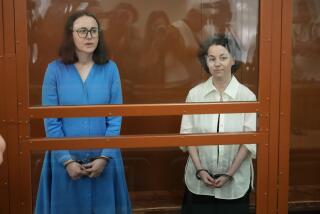Critic’s Notebook: In Václav Havel’s plays, politics was personal
What defines a political artist? Ideology? Activism? Revolutionary fervor?
The question preoccupied me recently as I spent time rereading plays by Václav Havel, the dissident playwright turned Czech president, who died late last year. And the answer I discovered in “The Memorandum,” “The Increased Difficulty of Concentration” and “Largo Desolato” had less to do with platforms and protests than I remembered. In fact, the only programmatic agenda I came upon was an unwavering defense of the individual, which just so happens to be the only agenda that will never grow obsolete.
Havel didn’t conform to the European model of political playwright. His greatest influence was the theater of the absurd, as perfected by Samuel Beckett and Harold Pinter, not the epic theater of Bertolt Brecht. His relationship to the absurdist vision, however, wasn’t merely philosophical or poetic. The prevailing sense of social estrangement, the breakdown in language and logic and the fun house distortion of meaning, all hallmarks of the postwar existentialist style, were rooted in a particular bureaucratic context in Havel’s plays, the plight of those subjected to the very legitimate paranoia of totalitarian rule.
Havel was harassed, persecuted and repeatedly imprisoned after the Soviets invaded Czechoslovakia in 1968. His plays were subsequently banned in his home country, a particularly grim fate for a playwright whose solidarity with his audience was a primary source of inspiration. This history looms over the plays mightily. But even though his dramas often grapple with the situation of a public figure whose door is darkened by Kafkaesque henchmen, it is always the private man thrust into the fore.
The sensibility, to put it another way, isn’t that of a statesman but that of a distinguished man of the people, a citizen-intellectual at home in his kitchen, library and bedroom. There’s nothing remotely campaigning about the works. Indeed, the only office that Havel seems to covet in his plays is his home office, away from the distorting pressures that separate an artist from his truth. That he was ultimately chosen to lead his country into a liberated chapter of its history says more about the moral, intellectual and humanitarian values of the Czechoslovakian people than it does about the ambitiousness of his political nature.
For Havel, politics was personal, so it’s no surprise that one feels more intimately acquainted with him after reading his plays. This isn’t to say that the works are directly autobiographical. I have no knowledge of whether Havel juggled women the way his dramatic stand-ins sheepishly yet inveterately do. But it was part of Havel’s mission to remind the world that even under extreme oppression life isn’t defined by politics alone. That is one way in which Havel’s plays help sharpen if not redefine our understanding of what political theater can be.
Consider, for example, the fixation on food as a background theme. Characters obsess over lunch menus, long futilely for honey, greedily eye plums and make a fuss over the meagerest of dinner ingredients.They’re not necessarily hungry, but they’re definitely deprived. Historically, this invokes the shortages and lines for basic necessities that were such a stark aspect of life behind the Iron Curtain. But theatrically, this preoccupation with meals throws into relief the desires that can’t be corralled by any government. Even when reality resembles something out of Orwell, the inner truth of an infinitely deferred fulfillment is closer to Beckett.
The plays don’t have the same metaphoric power of the best of the absurdists. Their arrangements are looser, more repetitive. There are doors, and there are irreconcilable demands made by visitors, some invited, some not. There is usually a figure wrestling between his conscience and an illusion of safety. And everywhere there is menacing double-speak, a cautionary motif elaborately developed in “The Memorandum,” in which a new interoffice form of communication known as Ptydepe is impossibly introduced.
Tom Stoppard, in his introduction to his English translation of “The Memorandum,” praises Havel for his “playfulness” and “utter lack of righteousness or petulance or bile.” And indeed one of the most remarkable aspects of Havel’s writing is the gentleness of the irony arising out of the most ungentle of circumstances. The plays preserve a great deal of information about the experience of 20th century tyranny, but their vitality springs from inextinguishable humanism.
“I’m a humanist and my concept of directing this organization derives from the idea that every single member of the staff is human and must become more and more human.” These words are spoken in “The Memorandum” by the managing director, who has arrived at work one morning to find that the language of his office has been hijacked. And they serve as a kind of credo for Havel, who fought against the jargon of a brutal political orthodoxy with the clarifying power of farce.
It takes a fearless comic instinct to redirect the weapons of one’s oppressor, and Havel’s courage was certainly appreciated by such luminaries as Beckett, who dedicated his play “Catastrophe” to him, and Pinter, who was a friend as well as a professional advocate. Havel didn’t consider himself in their Olympian league, but he did feel a sense of brotherhood with Pinter, who returned the sentiment. (On one occasion, Pinter, as reported in wife Antonia Fraser’s memoir “Must You Go?,” took Havel’s hand and said in dramatic Pinteresque fashion, “If I had been in your circumstances, I like to think that I would have behaved as you have.” Pause. “I think I would.”)
Havel’s plays, once taken up as a cause by American theater companies, were never especially popular in the U.S. and are seldom mounted today. Blanka Zizka, the Czech-born artistic director of Philadelphia’s Wilma Theater, which has produced Havel, explained to me via email that Havel’s plays, “born out of life under a political system that had become absurdly bureaucratic,” may come off as “absurd, ironic and perhaps repetitious” to an American audience. But to those living in the Soviet bloc, Zizka says, Havel’s depictions “were the closest thing to reality.”
Complicating Havel’s reception, Zizka says, is the difficulty of translating humor. In addition, she notes that his characters are often hard to empathize with and that rather than offering emotional revelations, the playwright provides “a distancing reflection on the willingness of human beings to conform to the status quo and to participate in empty rituals, lies, and absurdities in order to survive.”
In other words, there is more to Havel’s legacy than the shining example of brave commitment or the historical curiosity of a political artist being drafted by his fellow citizens to peacefully lead them into an emancipated era. Revivals here will be few and far between, but just knowing the plays exist, bearing creative witness to all too real political depravity, should be a comfort to us all.
More to Read
The biggest entertainment stories
Get our big stories about Hollywood, film, television, music, arts, culture and more right in your inbox as soon as they publish.
You may occasionally receive promotional content from the Los Angeles Times.











